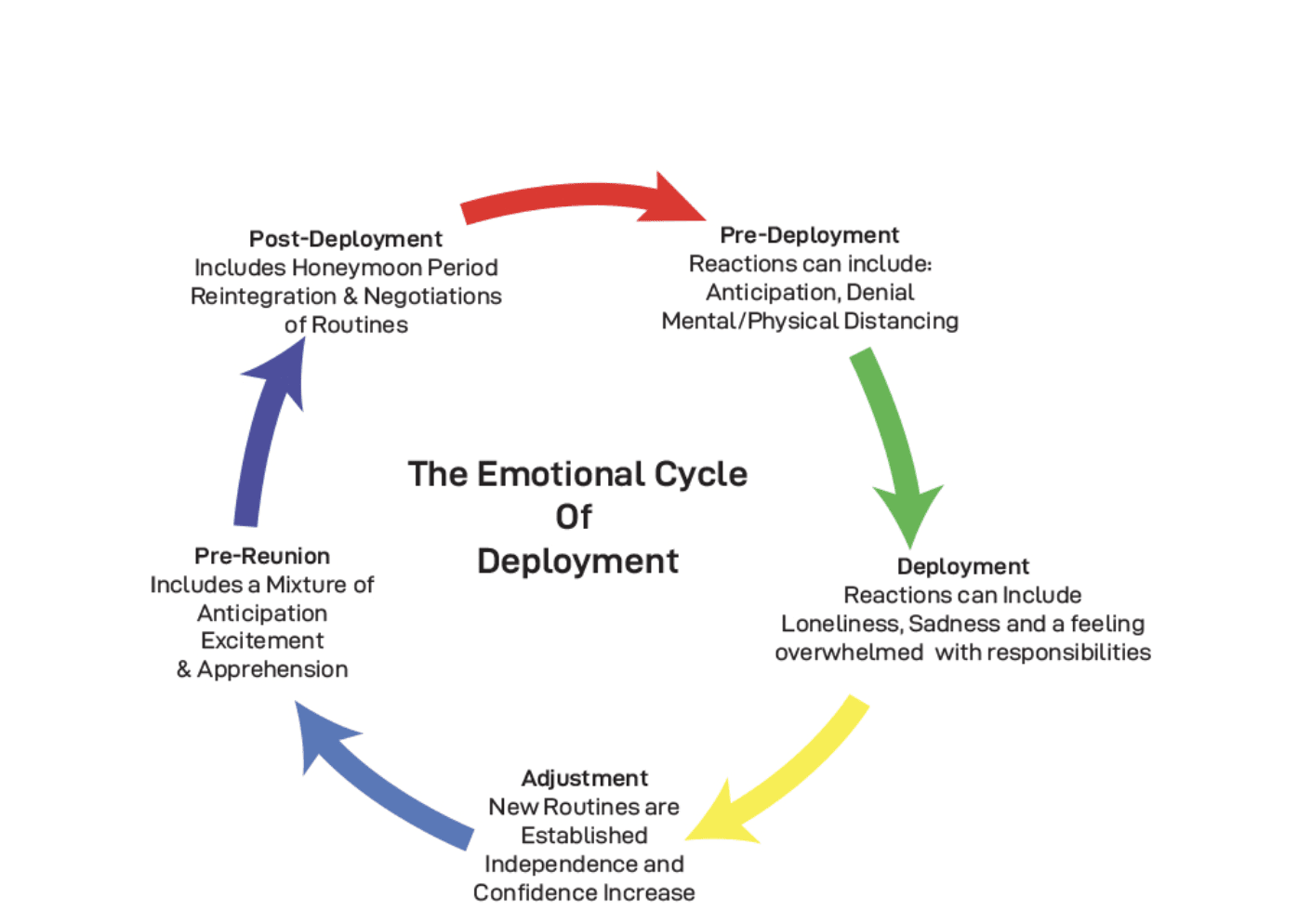By Karen Shirer, Ph.D.
Summary
- Reintegration after deployment can pose relationship challenges, but it can also provide opportunities for military couples.
- Research shows that by focusing on relationship processes post-deployment, couples can strengthen their relationship.
- Resources for service providers on strengthening military couples’ relationships are provided below.
When couples and families reunite after deployment, they enter into a time of both challenge and opportunity. A recent OneOp webinar, The Relationship Changes of Military Couples During Reintegration, explores how this period of transition often raises questions for military couples about the nature, status, and future of their relationship. Military couples also face a greater risk of relationship distress during post-deployment (i.e., reintegration).
The Relationship Changes of Military Couples During Reintegration: A Webinar Recap
Dr. Lynn Knobloch-Fedders and her colleagues conducted a longitudinal research study with military couples after deployment. Couples separately completed an online questionnaire every month, for eight months, after the service member and their partner were reunited.
The study was based on the Emotional Cycle of Deployment (see Figure 1.), which outlines the key challenges of the five stages of the deployment. The fifth phase, post-deployment, includes these challenges:
- The honeymoon phase during homecoming often fades with the demands of daily life.
- The service member (SM) begins to reassert their role in the family and at-home partners adjust to less independence.
- New household routines need to be established and negotiated to include the SM (e.g., who will pay the bills, who will bring the children to school).
- The couple will seek to re-establish sexual intimacy.

Figure 1. The Emotional Cycle of Deployment. Source: https://www.military.ie/en/public-information/defence-forces-families/overseas-deployment/
The study found several areas where military couples experienced positive, negative, and neutral changes in their relationships. These areas included emotional intimacy, closeness, and support; sexual intimacy and romance; appraisals of the relationship; readjustment to daily life; conflict; and commitment to the relationship. Overall, the study found that post-deployment is a much more complex time than earlier studies have indicated. However, there are steps that military family service providers can take to help couples move through this transition more smoothly.
Here’s what the couples in the study said about their post-deployment experience:
“We’re telling each other we love each other” (at-home partner in Month 1, positive)
“It feels more distant” (Service Member in Month 1, negative)
“Feels like in some ways we have gotten closer, but in some ways, we have grown apart” (at-home partner in Month 2, neutral)
Want to learn more? Check out the archived webinar for additional details on this study’s findings. Service providers that assist military families may find the information very helpful. You can also learn more about the study with this research brief from Military REACH.
Putting the Research into Action
Knobloch-Fedders and colleagues recommend offering prevention and intervention services to help military couples negotiate relationship changes post-deployment. These services include education and counseling that focus on building healthy relationship skills like emotional regulation, stress management, communication, and conflict management skills.
Resources and professional development opportunities are available from OneOp as well as other online sources for service providers to apply to your work with military couples.
Here are some resources to get you started!
OneOp Family Transitions Resources
- A Close Look at Relationships: Supporting Military Couples webinar series
- Relationship Education: An Important Tool for Strengthening Military Families podcast series
- An Important Tool for Strengthening Couples’ Relationships in the Wake of COVID-19 (Extension Connect) blog post
- Hard Is Normal: What Research Tells Us about Supporting Military Families during Deployment blog post
MilitaryOneSource Resources
Evidence-based Prevention Programs
- ADAPT Parenting Tools: designed for couples who have children and solo parents during reintegration.
- FOCUS: Resilience Training for Military Families: teaches family members skills for emotional regulation, communication, problem-solving, goal setting, and managing trauma and stress.
Call to Action
- Share this post and the resources with colleagues, friends, and families who could benefit from the information.
- View the archived webinar and other OneOp webinars. You can earn continuing education credits (CEs) for doing so!
- Check out these unique resources used in this post and feel free to share yours with us!
- Check-in [often] with the military families and communities that you work with to see how they are doing, especially through the various phases of the deployment cycle.
References
Knobloch-Fedders, L. M., Knobloch, L. K., Scott, S., & Fiore, H. (2020). Relationship changes of military couples during reintegration: A longitudinal analysis. Journal of Social and Personal Relationships, 37(7), 2145-2165. https://doi.org/10.1177%2F0265407520917461
Military Reach. (2021). Military REACH’s review of Relationship Changes of Military Couples During Reintegration: A Longitudinal Analysis. Auburn University.
Pincus, Simon H.; House, Robert; Christenson, Joseph; Adler, & Lawrence E. (2001). The emotional cycle of deployment: a military family perspective. U.S. Army Medical Department Journal, Apr./June, 15-23, (OCoLC)32785416. ISSN 1524-0436. Available at: https://stimson.contentdm.oclc.org/digital/collection/p15290coll3/id/898/
 Karen Shirer is a member of the Military Families Learning Network Family Transitions Team and was previously the Associate Dean with the University of Minnesota, Extension Center for Family Development. Karen is also the parent of two adult daughters, a grandmother, a spouse, and a cancer survivor.
Karen Shirer is a member of the Military Families Learning Network Family Transitions Team and was previously the Associate Dean with the University of Minnesota, Extension Center for Family Development. Karen is also the parent of two adult daughters, a grandmother, a spouse, and a cancer survivor.
Photo Source: Pixels















